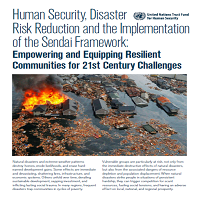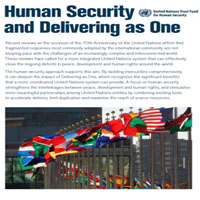The Human Security Unit (HSU) has produced a series of Policy Briefs on current thematic issues at the United Nations, including the SDGs, climate change, migration, and delivering as one. This is accompanied by short Info Notes explaining the human security approach and its added value as well as the work of the UN Trust Fund for Human Security (UNTFHS) and the HSU.
POLICY BRIEF: WHAT IS HUMAN SECURITY?
For many people, today’s world is an insecure threats on many fronts. Natural disasters, violent conflicts, persistent poverty, epidemics and economic downturns impose hardships and undercut prospects for peace and stability, as well as sustainable development. Crises are complex, entailing multiple forms of human insecurity. When they overlap, they can grow exponentially, spilling into all aspects of people’s lives, destroying entire communities and crossing national borders.
Policy brief: UN Trust Fund for Human Security
The UNTFHS brings diverse partners together to collaborate with Governments in addressing the needs and vulnerabilities of local communities. Programmes help close institutional gaps that hinder appropriate responses to many dimensions of human insecurity, and advance empowerment and capacity-building measures that increase the resilience of vulnerable communities and people.
Policy brief: The Human Security Unit
The Human Security Unit is the United Nations champion of human security. Established in 2004, the UN’s Human Security Unit is charged with raising awareness and encouraging global action so that through human security initiatives, all people can eventually live free from fear, want, and indignity.
Policy brief: Human Security and Agenda 2030
Based on a wealth of experiences in over 90 countries, the application of human security can significantly enhance actions taken by the global community, Member States, civil society and UN entities to fully realise the transformative promise of Agenda 2030 and the Sustainable Development Goals.
Policy brief: ENHANCING TRUST IN MULTILATERALISM THROUGH HUMAN SECURITY
At a time when insurmountable human suffering is defying trust in the efficacy of our international system, we are reminded of the importance of “we the peoples” to live free from fear, want and indignity. While progress has been made, recent trends remind us of the need for a more inclusive multilateral system. The human security approach supports this aim. As a multidimensional framework, it strengthens the interlinkages between the pillars of the United Nations and stimulates meaningful partnerships among United Nations entities, Member States, civil society, the private sector and local communities to accelerate delivery, limit duplication and maximize the reach of scarce resources with no one left behind.
Policy brief: Migration and HS
The human security approach takes a comprehensive methodology to identifying and responding to a cross-section of risks faced by people on the move. As such, it can play an invaluable role in managing migration in today’s world, particularly in light of the Agenda 2030 commitments.
Policy brief: Building resilience to climate threats
Responding to a changing climate requires a comprehensive, integrated strategies that simultaneously address social, economic and environmental consequences. Human security adopts this approach, and UN Member States have overwhelmingly highlighted its importance in acting on climate change.
POLICY BRIEF: HUMAN SECURITY, DISASTER RISK REDUCTION AND THE IMPLEMENTATION OF THE SENDAI FRAMEWORK
The human security approach offers an important tool for realizing the priorities of the Sendai Framework. By promoting greater integration and identifying new entry points for collective action, the application of human security strengthens governance, enhances preparedness, and leads to enriched strategies at the local, national, and regional levels.
POLICY BRIEF: BRIDGING THE GAP BETWEEN HUMANITARIAN ASSISTANCE AND SUSTAINABLE DEVELOPMENT
The human security approach offers a proven, well-tested framework for bridging the humanitarian-development divide. Grounded in the notion that threats to people’s survival, livelihood and dignity are seldom singular in nature, human security recognizes the full array of insecurities that can both propel the devastating force of a crisis and undercut prospects for sustainable development.
Policy brief: Human Security and delivering as one
Recent reviews affirm that fragmented responses most commonly adopted by the international community are not keeping pace with the challenges of an increasingly complex and interconnected world. These reviews have called for a more integrated UN system that can effectively close the ongoing deficits in peace, development, and human rights around the world. By tackling insecurities comprehensively, the UN supports this aim, and can deepen the impact of Delivering as One.
Policy brief: Human Security and Food Security
As the international community transitions from the Millennium Development Goals (MDGs) to the Sustainable Development Goals (SDGs), the challenges ahead of Member States is to build on the
substantial progress made in reducing poverty and hunger by 2015. A total of 72 countries out of 129 countries achieved the MDG 11 hunger target. Nonetheless, around 800 million people globally –
1 in 9 people on the planet – still suffer from hunger.











